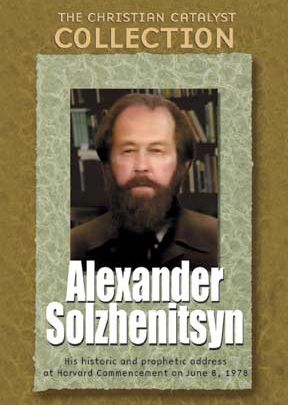
[ABOVE—Russian writer and Nobel prize winner Aleksandr Solzhenitsyn looks out from a train, in Vladivostok, summer 1994, before departing on a journey across Russia. Solzhenitsyn returned to Russia after nearly twenty years in exile. Photo by Mikhail Evstafiev. I, Evstafiev [GFDL (http://www.gnu.org/copyleft/fdl.html), CC-BY-SA-3.0 (http://creativecommons.org/licenses/by-sa/3.0/) or CC BY-SA 2.5 (http://creativecommons.org/licenses/by-sa/2.5)], via Wikimedia Commons https://commons.wikimedia.org/wiki/File:A_solzhenitsin.JPG]
Imprisonment has sometimes been the means of causing individuals to question their purpose in life with the result that they open up to God. Such was the case with Alexander Solzhenitsyn. Hurled into the infamous Gulag Archipelago (Russia’s prison “islands”) for criticizing Stalin, he came to recognize that he had been on a course which was turning him into an inhuman monster. He changed direction.
Great Souls: Aleksandr Solzhenitsyn Hailed as the greatest Russian writer of the 20th century, Aleksandr Solzhenitsyn went from avowed Communist to Gulag prisoner and outspoken advocate for the destruction of the Soviet empire. This is his historic and prophetic address at Harvard.
While in the prison, he observed the system around him and collected stories of fellow prisoners which he later recorded in his massive and intense work, The Gulag Archipelago. This short excerpt is from Book II Part IV The Soul and Barbed Wire, Chapter 1 “The Ascent.”
Excerpt from The Gulag Archipelago
It was granted me to carry away from my prison years on my bent back, which nearly broke beneath its load, this essential experience: how a human being becomes evil and how good. In the intoxication of youthful successes I had felt myself to be infallible, and I was therefore cruel. In the surfeit of power I was a muderer and an oppressor. In my most evil moments I was convinced that I was doing good, and I was well supplied with systematic arguments. And it was only when I lay there on rotting prison straw that I sensed within myself the stirrings of good. Gradually it was disclosed to me that the line separating good and evil passes not through states, nor between classes, nor between political parties either—but right through every human heart—and through all human hearts…
…It is impossible to expel evil from the world in its entirety, but it is possible to constrict it within each person.
And since that time I have come to understand the falsehood of all the revolutions of history: They destroy only those carriers of evil contemporary with them (and also fail, out of haste to discriminate the carriers of good as well). And they then take to themselves as their heritage the actual evil itself, magnified still more.
….
And that is why I turn back to the years of my imprisonment and say, sometimes to the astonishment of those about me: “Bless you, prison!”

